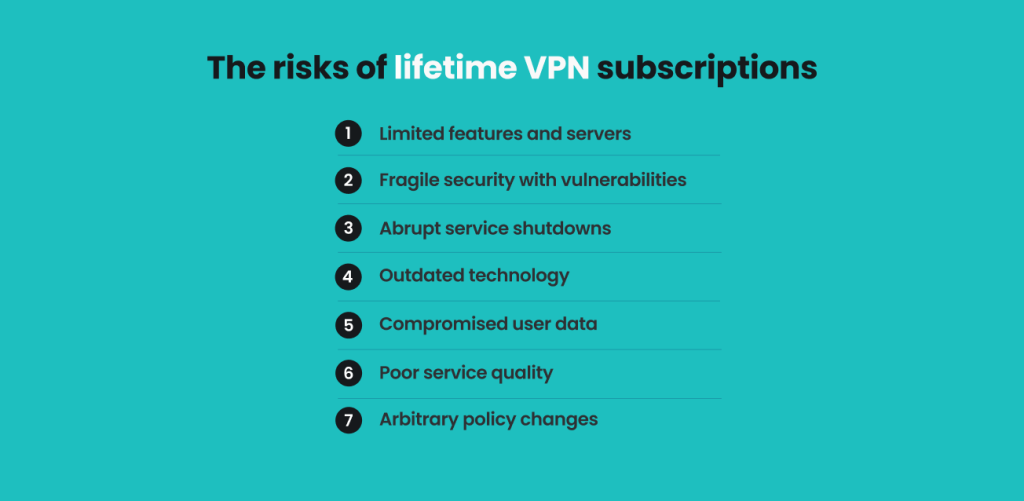
Lifetime VPNs (Virtual Private Networks) may sound like a steal — for a seemingly affordable one-off fee, you get a lifetime subscription to a VPN. However, the reality is that you shouldn’t be too quick to jump on these lifetime VPN deals.
Many companies offering lifetime VPN subscriptions don’t stick around long enough for you to get any real value out of your money. They also often neglect updates and security patches over time, putting your privacy and security at risk. Worse yet, some are scams run by shady characters out to make a quick buck.
If you’re still on the fence about lifetime VPN deals, let’s explore the different risks involved. Once that’s cleared up, I’ll walk you through more reliable alternatives.
Table of contents
What is a lifetime VPN?
A lifetime VPN is a subscription to a VPN where you pay once for lifelong access to the service. There are supposedly no renewal fees or additional charges down the line.
Although the upfront fee is usually on the higher side, it often works out to be more cost-effective than monthly or yearly subscriptions in the long run. Many lifetime VPN subscription providers also offer massive discounts to make the initial investment more palatable.
Risks of lifetime VPN subscriptions
As enticing as a lifetime VPN subscription appears, it comes with various risks that can compromise your privacy, security, and user experience. It could even end up costing you more ultimately. Here are some of the pitfalls:
Limited features and updates
Most lifetime VPNs offer fewer features compared to those with monthly or yearly subscription models. Advanced functionalities such as double VPN, ad blockers, and split tunneling are also typically off-limits.
Additionally, they often have smaller server fleets and limited server locations. The first can lead to overcrowding, while the latter means you might not be able to find a nearby server — both of which could result in slower connection speeds for you.
Security concerns
Lifetime VPNs often lack the financial stability to invest in security infrastructure. So, you’ll likely see outdated encryption, weak tunneling protocols, and unreliable servers. They also might not roll out regular updates and security patches, exposing you to various vulnerabilities and evolving threats. The absence of advanced security measures only makes things worse.
Additionally, lifetime VPNs are more likely to forgo independent security audits, leaving room for doubts about their claims and reliability. In contrast, reputable providers offering monthly or annual plans tend to be more transparent about such audits. Surfshark, for example, has had its no-logs policy verified by Deloitte, a Big Four firm.
Provider sustainability
These providers are taking a big gamble by offering lifetime VPN deals because of the unsustainable business model. This raises concerns about what they will do when the funds from those one-time payments eventually dry up, and they can’t lure in new subscribers.
One common fallback seen with past providers is shutting down service as soon as the money runs out — leaving their users without a VPN service despite having paid for a supposed lifetime subscription.
Evolving technology
Tight finances could cause lifetime VPNs to struggle to keep up with new technological developments. Encryption algorithms, security protocols, and privacy features require constant updates and improvements to adapt to new threats. Without funds for upgrades, the VPN service can quickly become obsolete and unreliable.
The same applies to device and platform compatibility. With new devices and operating systems released frequently, the VPN might only work on some devices and platforms.

Common scams
Besides posing various risks, some lifetime VPNs may turn out to be scams. Here’s how they usually play out:
Selling user data
Lifetime VPN providers, particularly those with unrealistically low price tags, might fund their operations by monetizing your data. This is a lucrative money-making strategy where the providers take advantage of their access to user data and sell it to third parties such as advertisers and even malicious actors.
By putting your trust in the VPN, you could inadvertently expose your browsing activities, IP address, and other sensitive identifying information, defeating the purpose of investing in a VPN in the first place.
Providing poor service
Due to their unsustainable business models, some lifetime VPNs may compromise on quality to cut costs. As a result, issues such as slow connection speeds, frequent disconnections, overcrowded servers, compatibility problems, and glitches are par for the course with these providers.
In the face of their financial struggles, good customer support also tends to go out of the window. Since you’ve already purchased a lifetime subscription, there’s little incentive for prompt and responsive support. So, getting a timely or helpful response can be challenging or even impossible.
Terminating without notice
A common ploy among lifetime VPNs is to abruptly shut down operations after collecting upfront payments from a certain number of users. This leaves you in the lurch without VPN protection and no way to recoup your money. On top of that, the shuttered VPN provider may retain your personal information for further exploitation.
Additionally, many lifetime VPN subscriptions have clauses in their terms and conditions allowing them to terminate the service or impose additional restrictions without warning or refunds. Some even forcefully convert ongoing lifetime subscriptions into annual paid plans — introducing new recurring payments without notice or compensation. Either way, you’d be left without recourse.
Lifetime VPN subscription alternatives
Instead of a lifetime VPN subscription, consider other options that offer more secure and reliable protection for your personal data. Here are some alternatives:
- Monthly or yearly VPN subscriptions: most reputable VPNs, including Surfshark, offer both options. While they may seem pricier, you’re actually investing in up-to-date security measures, better customer support, and continuous service improvements. Plus, there are cheap VPNs out there to suit all budgets.
- Free VPNs: free VPNs share many similarities with lifetime VPNs. Like lifetime VPNs, they tend to be plagued by weak security, poor performance, fewer servers, and limited bandwidth. However, the key advantage of free VPNs is that they don’t require significant upfront fees, unlike lifetime VPNs. This gives you the freedom to switch to a reliable paid VPN whenever you wish.
- Tor (The Onion Router): Tor is a free software solution that encrypts and routes your traffic through a volunteer-run network to hide your IP address and shield your online activities from snoopers. Compared to a VPN, Tor requires more technical know-how.
- Proxy servers: proxy servers function as intermediaries between your device and the internet, forwarding your requests to websites and retrieving data on your behalf. Unlike VPNs, which encrypt your entire internet connection, proxy servers only mask your IP address. They can be a viable option in a pinch if you only want to hide your IP address without encrypting your traffic.
How to evaluate VPN offers
You can minimize the risk of falling for a VPN scam by learning to spot its warning signs. Here are some precautions to take when considering VPN offers:
- Check for transparency: reputable providers are upfront about their data-handling processes and often back up their claims with third-party security audits;
- Be cautious of overly cheap deals: running a VPN service is a costly business. A VPN priced much lower than its counterparts may indicate dubious intentions or even a scam;
- Beware of suspicious payment methods: unfamiliar payment options could signify a scam. Legitimate providers usually accept widely recognized methods;
- Assess security features: reliable VPN providers clearly outline their security measures. It’s best to steer clear of VPNs that lack essential features or only provide fuzzy information;
- Avoid unreasonable policies: if a provider doesn’t offer a risk-free way to try out its VPN, it may prioritize profit above all else. Trustworthy providers often offer a money-back guarantee policy, such as Surfshark’s 30-day money-back guarantee;
- Be wary of a lack of information: incomplete or vague details about the VPN provider, including its technologies, background, privacy policy, and terms of service, suggest a potential scam;
- Go through user reviews: make sure to read user feedback before committing to a plan. Consistently poor reviews are a huge red flag;
- Evaluate customer support: a responsible VPN provider makes it easy to reach its support team through multiple channels. Long wait times or a complete lack of reply may signal you’re dealing with a scam.
To sum up: there are better alternatives to lifetime VPNs
On the surface, a lifetime VPN sounds like an ideal solution — paying a little more upfront to enjoy lifelong VPN protection. However, you could end up compromising your security, privacy, and finances if you give in to this seemingly tempting offer.
A better alternative is to opt for a monthly or yearly subscription with a trusted VPN like Surfshark. At a fair price, you can enjoy robust security infrastructure, advanced features, and 24/7 customer support.
FAQ
Is there a lifetime VPN?
While there are many lifetime VPNs out there, it’s crucial to research thoroughly before committing. Some of those services might prove to be unreliable — lacking the security, quality, and sustainability needed to justify the heavy upfront fee you pay.
Is there a permanent free VPN?
Some providers claim to offer a permanent free VPN solution, but I strongly advise against using them. There’s no way to tell if they’ll shut down operations or change policies later to eliminate the free plan. Free VPN solutions also often have severe limitations, such as weak security, slow speeds, and data caps, making them unreliable for long-term use.
Which VPN is unlimited?
Many providers claiming to offer unlimited VPNs may fail to deliver on their promise. For the very few that do provide this service, there are still potential risks, such as data logging, weak security, and limited features. Subscribing to a monthly or yearly paid VPN plan and renewing as needed is often a far safer option.
Is a free unlimited VPN safe?
No, most free unlimited VPNs aren’t safe. Beyond subpar security, performance, and data allowances, these providers tend to inundate you with intrusive ads. Additionally, they could log your data and sell it to the highest bidder, risking your privacy and security. A better option is to opt for a secure paid VPN service like Surfshark.


